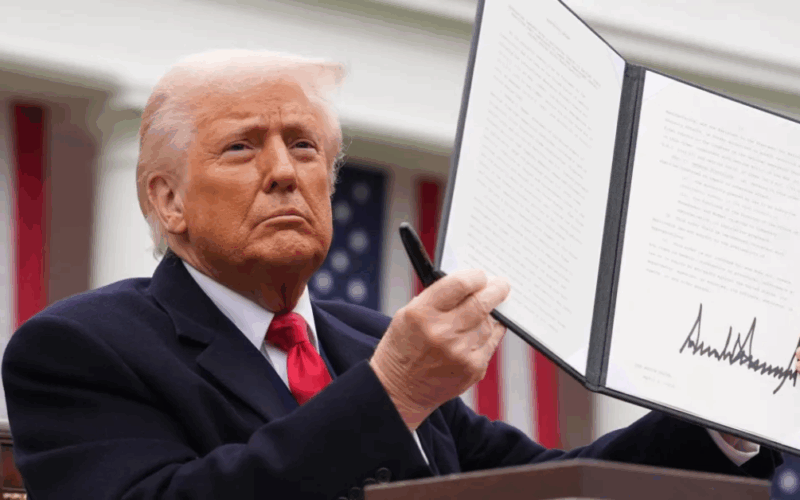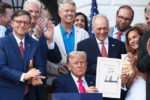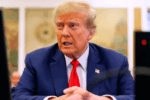Washington, D.C. – The Department of Justice (DOJ) has issued a stark warning about the potential financial consequences of striking down President Donald Trump’s tariffs imposed under the 1977 International Emergency Economic Powers Act (IEEPA). The DOJ cautions that invalidating these tariffs could trigger a financial catastrophe comparable to the Great Depression, putting vital social programs like Social Security and Medicare at serious risk.
This development comes as the U.S. Court of Appeals for the Federal Circuit reviews whether the tariffs, currently challenged for overstepping presidential authority, should remain in place. The outcome could reshape trade policies and have far-reaching effects on the U.S. economy and its social safety nets.
The Department of Justice’s Dire Warning
In a recent letter to the U.S. Court of Appeals, U.S. Solicitor General D. John Sauer highlighted the potentially devastating fallout if Trump’s tariffs are repealed. Sauer wrote,
“In such a scenario, people would be forced from their homes, millions of jobs would be eliminated, hard-working Americans would lose their savings, and even Social Security and Medicare could be threatened.”
The letter underlines how dismantling these tariffs might jeopardize not only the immediate market but also the foundations of key social welfare programs.
- The tariffs were initially challenged in May by the Court of International Trade (CIT) which ruled that Trump exceeded his authority under IEEPA.
- CIT and the District Court for the District of Columbia’s rulings have been temporarily stayed, pending appeal.
- The appellate court has granted a stay allowing the tariffs to remain during litigation.
Understanding the IEEPA and Its Impact on Trade
The International Emergency Economic Powers Act (IEEPA), passed in 1977, grants presidents broad power to regulate commerce during national emergencies in response to “an unusual and extraordinary threat.”
Trump justified tariffs on trading partners including Canada, Mexico, and China citing concerns over trade deficits and fentanyl smuggling. The CIT’s ruling contested the administration’s expansive use of IEEPA, stating,
“The court does not read IEEPA to confer such unbounded authority and sets aside the challenged tariffs imposed thereunder.”
This legal tussle has cast uncertainty over the scope of presidential powers and the future of U.S. trade policy.
Legal Battles and Political Reactions Surrounding Tariffs
The White House strongly opposed the CIT ruling, labeling it a “judicial coup,” and has appealed the decision. Meanwhile, an 11-judge appellate panel has expressed skepticism regarding the administration’s rationale for invoking the 1977 law, as reported by Reuters.
Despite the lawsuits, the Trump administration actively negotiated agreements with major global economies such as the European Union, Japan, and South Korea. These initiatives involve over $1 trillion in investment commitments aimed at reducing tariff rates and investing in private-sector projects.
Economic Risks Highlighted by the DOJ and Future Implications
In its latest court filing, the DOJ shifted focus from legal interpretations to the grave economic risks of dismantling the tariffs. Assistant Attorney General Brett Shumate and Sauer warned that reversing these international agreements could destabilize the global economy and jeopardize U.S. financial commitments:
“The President believes that our country would not be able to pay back the trillions of dollars that other countries have already committed to pay, which could lead to financial ruin.”
The filing also warned of a potential collapse akin to the 1929 Great Depression should these deals be forced to unravel, threatening both economic stability and funding for social programs.
- The agreements represent historic commitments involving trillions of dollars.
- Unwinding these deals could result in severe financial consequences for the U.S.
- Trump echoed these concerns on Truth Social, emphasizing the irreversible damage such a court ruling could inflict.
What’s at Stake for Social Security and Medicare?
The DOJ’s warning underscores a crucial risk to the nation’s Social Security and Medicare programs, which millions of Americans rely upon. A breakdown in tariff agreements could force the government into deep financial distress, threatening the ability to sustain these vital programs.
This potential threat highlights the broader stakes involved in the ongoing legal battles over the scope of presidential authority and international trade policy.
Looking Forward: Navigating Uncertainty in Trade Policies
As the appeals process continues, the future of Trump’s tariff policies remains uncertain. The courts’ final decisions will have significant implications for trade, the economy, and crucial social welfare programs.
Stakeholders and citizens alike await a resolution that balances legal authority, economic stability, and the protection of social programs.




